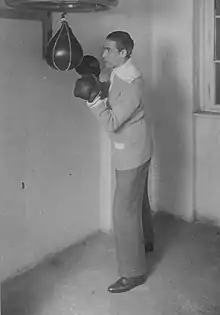Ernst Deutsch | |
|---|---|
 Deutsch in his gym, 1931 | |
| Born | 16 September 1890 |
| Died | 22 March 1969 (aged 78) |
| Other names | Ernest Dorian |
| Citizenship | Austrian |
| Occupation | Actor |
| Years active | 1916–1966 |
| Known for | The Third Man |
| Spouse | Anuschka Fuchs (1922–1969; his death) |
Ernst Deutsch, also known as Ernest Dorian (16 September 1890 – 22 March 1969), was a Jewish[1] Austrian actor. In 1916, his performance as the protagonist in the world première of Walter Hasenclever's Expressionist play The Son in Dresden was praised.[2] Deutsch also played the antihero Famulus in Paul Wegener's The Golem: How He Came into the World in 1920. He is known by English-speaking audiences for his role as Baron Kurtz in Carol Reed's 1949 film noir, The Third Man.
Family
Deutsch was the son of Prague-based Jewish merchant Ludwig Kraus and his wife, Louise.[1] He married childhood friend Anuschka Fuchsova (daughter of Prague industrialist Arthur Fuchs) in 1922.[3] Anuschka's cousin, Herbert Fuchs of Robettin, was the brother-in-law of author Franz Werfel.
Life and career
Deutsch grew up in Prague, and attended high school. He was a skilled tennis player, ranking seventh on the Austro-Hungarian tennis list. After high school, Deutsch served in the army. He was a childhood friend of Franz Werfel.[4][5]
In 1914, Deutsch made his stage debut for Berthold Viertel at the People's Theatre in Vienna.[5] After a short season in Prague, Edgar Licho hired him for the Albert Theatre in Dresden, where he moved in 1916. In Dresden, Deutsch played Franz Moor in Schiller's The Robbers and Moritz Stiefel in Frank Wedekind's Spring Awakening. His performance in the title role of Hasenclever's The Son, which premiered on 8 October 1916, established him as an Expressionist actor; he also appeared in the play in 1918 and 1923.[3][4] In 1917, Deutsch went to the Volksbühne in Berlin. He appeared until 1933 on a number of stages in the city, gave guest performances in Hamburg, Munich and Vienna, and participated in a tour of South America. Beginning in 1916, Deutsch appeared in 42 silent films. In April 1933, he left Germany due to Nazi antisemitism. Deutsch returned to Vienna and Prague, gave guest performances in Zurich, Brussels and (in 1936) London where he appeared in Charles Bennett's play Page From a Diary in the West End. In 1938 he emigrated to New York City and played briefly on Broadway in 1939 before moving to Hollywood, where he became an American citizen.[3] Beginning 1942 he appeared as Ernest Dorian in Hollywood films, primarily as Nazis and German officers.[5][6]

After a 1946 stay in Buenos Aires, Deutsch returned to Vienna via Paris the following year. In Vienna, he became a member of the Burgtheater.[6] At the National Theatre Deutsch appeared in The Helpers of God, about Red Cross founder Henri Dunant, in 1948. Three years later he moved back to Berlin, appearing at the Schiller and Schlossparktheater. Deutsch also toured in Germany and abroad. Deutsch's film roles included Baron Kurtz in Carol Reed's film noir, The Third Man, starring Orson Welles and Joseph Cotten.[5] He received the Volpi Cup as Best Actor at the 9th Venice International Film Festival in 1948 Venice Film Festival for his performance in Der Prozeß.[7] Deutsch's performances in the title role of Gotthold Ephraim Lessing's Nathan the Wise and as Shylock in Shakespeare's The Merchant of Venice were critically praised.[8][9] He played Nathan for more than 2,000 performances, and traveled with productions throughout Europe.[3][10]
Deutsch died on 22 March 1969 in West Berlin,[3] and is buried in the Jewish cemetery on the Berlin highway. For the fourth anniversary of his death in 1973, Friedrich Schütter's former Junges Theater in the Uhlenhorst quarter of Hamburg was renamed after Deutsch (who had staged a performance of Nathan The Wise there shortly before his death).[10]
Filmography
- Die Rache der Toten (1916) – Schreiber, Ferenc
- Die zweite Frau (1917) – Jesuit
- Apokalypse (1918)
- Pique Dame (1918) – Graf St-. Germain
- Irrungen (1919) – Franz, Arbeiter
- The Geisha and the Samurai (1919)
- Die Frau im Käfig (1919)
- Blonde Poison (1919) – Rolf Röm (Enkel)
- The Galley Slave (2 parts) (1919) – Galeerensträfling
- Fluch der Vergangenheit (1919)
- Vom Schicksal erdrosselt (1919) – Ernst Dutton
- Die Tochter des Henkers (1919)
- The Monastery of Sendomir (1919)
- Aladdin und die Wunderlampe (1919)
- Hate (1920)
- From Morn to Midnight (1920) – Kassierer
- Monika Vogelsang (1920) – Johannes Walterspiel
- Gerechtigkeit (1920)
- Blackmailed (1920)
- The Hunt for Death (1920)
- The Golem: How He Came into the World (1920) – Der Rabbi Famulus
- Judith Trachtenberg (1920) – Judith's Brother
- Fiebernächte (1920)
- Ferreol (1920)
- Der gelbe Tod (2 parts) (1920)
- The Women House of Brescia (1920)
- Hannerl and Her Lovers (1921) – Priester
- Burning Country (1921) – Vikar Benedikt
- Lady Godiva (1921)
- Die Dame und der Landstreicher (1922)
- Duke Ferrante's End (1922) – Orlando
- Sein ist das Gericht (1922)
- Liebe kann man nicht kaufen (1922)
- Der Kampf ums Ich (1922)
- Der alte Gospodar (1922) – Zdenko & Wolfgan
- The Pagoda (1923)
- The Burning Secret (1923)
- The Ancient Law (1923) – Baruch, sein Sohn
- Debit and Credit (1924) – Bernhard
- Dagfin (1926) – Assairan, ein Armenier
- The Bordello in Rio (1927) – Plüsch (Popescu)
- Two Under the Stars (1927) – Pierre Marescot, Eintänzer
- Artists (1928) – Der Illusionist Maranoff
- The Prisoner of Corbal (1936) – The Fugitive
- Nurse Edith Cavell (1939) – Dr. Schroeder, Public Prosecutor
- The Man I Married (1940) – Otto
- Escape (1940) – Baron von Reiber (uncredited)
- So Ends Our Night (1941) – Dr. Behr
- Prisoner of Japan (1942) – Matsuru
- Enemy Agents Meet Ellery Queen (1942) – Dr. Morse, Lido Club Physician
- Reunion in France (1942) – Captain
- The Moon Is Down (1943) – Maj. Hunter
- Night Plane from Chungking (1943) – Major Brissac
- Isle of the Dead (1945) – Dr. Drossos
- The Trial (1948) – Scharf, Tempeldiener
- The Third Man (1949) – 'Baron' Kurtz
- K – Das Haus des Schweigens (1951) – Abel de Yonkh
- When the Heath Dreams at Night (1952)
- Nathan der Weise (1955, TV film) – Nathan
- Jedermann (1958, TV film)
- Sebastian Kneipp (1958) – Pope Leo XIII
- Ein Mädchen vom Lande (1961, TV film) – Frank Elgin
- Vor Sonnenuntergang (1962, TV film) – Matthias Clausen
- In der Strafkolonie (1963, TV film) – Der Reisende
- Der Fall Bohr (1966, TV film) – Peter von Bohr (final film role)
References
- 1 2 Malkin & Rokem 2010.
- ↑ Schürer 1997, pp. xiv–xv.
- 1 2 3 4 5 "Ernst Deutsch". Film – Zeit (in German). Archived from the original on 19 August 2014. Retrieved 16 August 2014.
- 1 2 Malkin & Rokem 2010, p. 155.
- 1 2 3 4 Grange 2006, p. 74.
- 1 2 Nahshon 2012, p. 281.
- ↑ Italy; Documents and Notes. Centro di documentazione. 1964. p. 73.
- ↑ Sieg 2002, p. 67.
- ↑ Jansohn 2006, p. 207.
- 1 2 Grange 2006, p. 75.
Bibliography
- Schürer, Ernst (1997). German Expressionist Plays:The German Library serial vol. 66. New York: Continuum. ISBN 978-0-8264-0950-8..
- Grange, William (2006). Historical Dictionary of German Theater. Scarecrow Press. ISBN 978-0-8108-6489-4.
- Jansohn, Christa (2006). German Shakespeare Studies at the Turn of the Twenty-first Century. University of Delaware Press. ISBN 978-0-87413-911-2.
- Sieg, Katrin (2002). Ethnic Drag: Performing Race, Nation, Sexuality in West Germany. University of Michigan Press. ISBN 0-472-11282-1.
- Nahshon, Edna (2012). Jews and Theater in an Intercultural Context. BRILL. ISBN 978-90-04-22717-0.
- Malkin, Jeanette R.; Rokem, Freddie (2010). Jews and the Making of Modern German Theatre. University of Iowa Press. ISBN 978-1-58729-934-6.